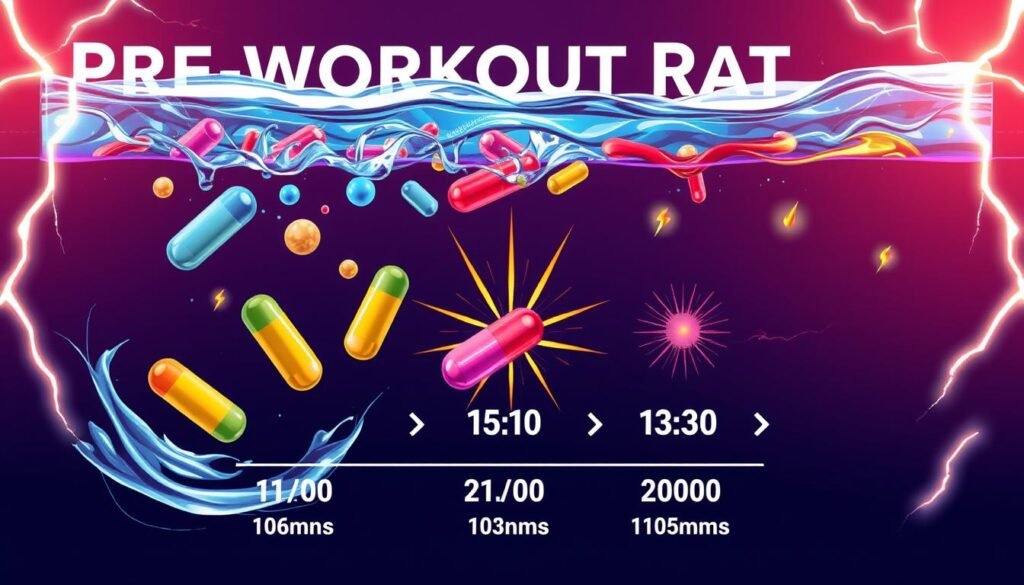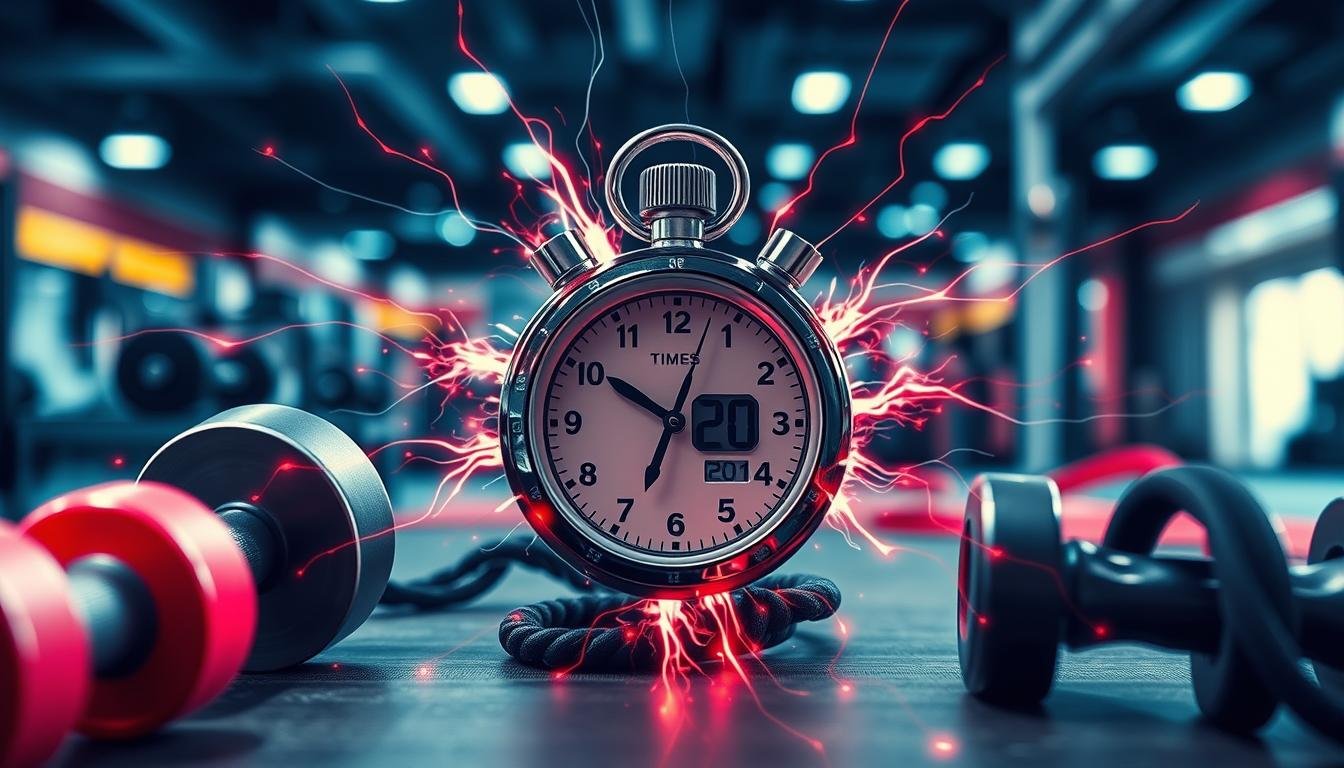As fitness lovers, we’ve all felt the energy boost from pre-workout supplements. They help athletes, gym-goers, and anyone wanting to improve their performance. But, how long do these effects last? This guide explores pre-workout supplements, their duration, and how to get the most out of them.
Pre-workout supplements come in many forms, like powders, capsules, and drinks. They aim to increase energy and endurance. They usually start working in 5 to 10 minutes and last 2 to 3 hours. But, how long they last depends on several factors, like your body’s response and the supplement’s quality.
A 2016 study found pre-workout can boost anaerobic power. Caffeine in pre-workout improves exercise performance, as shown in a 2021 study. Yet, how quickly pre-workout works and how you react to it varies. This is because people’s sensitivity to caffeine differs.
How Long Does Pre Workout Last
Key Takeaways
- Pre-workout supplements typically remain effective for 3 to 5 hours when taken in the recommended dosage based on body weight.
- Factors influencing pre-workout duration include genetics, body weight, and age, with overweight individuals potentially feeling the effects of caffeine more than those with lower body weight.
- It’s important to follow the recommended dosage listed on the pre-workout packaging and not deviate from it in order to avoid potential side effects.
- Hydration is essential for workout performance; staying well-hydrated ensures better absorption of nutrients and peak performance.
- Pre-workout supplements have potential benefits such as increased energy, improved focus, enhanced performance, better pumps, and reduced crashes, but may also cause side effects like jitters, anxiety, increased heart rate, and insomnia.
How Long Does Pre Workout Last
Understanding Pre-Workout Supplements
Pre-workout supplements are special mixes that help boost your athletic performance. They often include caffeine, creatine, amino acids, and vitamins. These ingredients help increase your energy, strength, and endurance. They also aid in recovery after your workout.
In 2020, the global pre-workout market was worth $13.98 billion. This shows how popular these supplements are among athletes and gym-goers. They are looking for the best way to perform at their peak.
What are Pre-Workout Supplements?
There are many types of pre-workout supplements. Some have stimulants like caffeine for an energy boost. Others are stimulant-free. There are also high-stim options for more intense effects.
Natural pre-workouts use ingredients from natural sources. Goal-based formulas focus on specific goals like muscle gain or weight loss.
Benefits of Pre-Workout Supplements
Pre-workout supplements offer many benefits. They are a favorite among fitness enthusiasts. Here are some of the key advantages:
- Increased energy levels, allowing you to push harder during workouts
- Enhanced athletic performance, enabling you to lift heavier weights or run faster
- Improved focus and mental clarity, helping you stay engaged throughout your session
- Increased blood flow, delivering more oxygen and nutrients to your muscles
- Reduced fatigue, allowing you to work out longer and with greater intensity
- Faster post-workout recovery, minimizing soreness and promoting muscle growth
| Ingredient | Benefit |
|---|---|
| Caffeine | Boosts energy and focus |
| Beta-Alanine | Increases endurance and reduces fatigue |
| Creatine | Enhances strength and muscle growth |
| L-Citrulline | Improves blood flow and nutrient delivery |
Key Ingredients in Pre-Workout Supplements
Pre-workout supplements aim to boost your workout performance and help reach fitness goals. They contain various ingredients that enhance energy, focus, and endurance. Let’s explore some key ingredients in these supplements and their effects.
Caffeine
Caffeine is a top choice in pre-workouts for its mental focus benefits. Studies show it improves exercise performance, especially in long and intense workouts. Caffeine’s effects last about 30-60 minutes, sometimes up to 2-4 hours, with a half-life of 3-7 hours.
Beta-Alanine
Beta-alanine is an amino acid that delays muscle fatigue and boosts aerobic power. It’s great for high-intensity exercises lasting 1 to 4 minutes. It increases endurance and reduces muscle soreness, safe in doses of 4 to 6 grams daily.
Creatine
Creatine energizes muscles during intense workouts. It delays fatigue, extends peak strength, and shortens recovery times. For muscle growth, take 3 to 5 grams per serving, enhancing energy and muscle contractions.
L-Citrulline
L-citrulline boosts athletic performance and eases muscle soreness. It increases blood flow and oxygen to muscles. Aim for 6 to 8 grams per dose for best results.
| Ingredient | Half-Life | Benefits |
|---|---|---|
| Caffeine | 3-7 hours | Improves mental focus and concentration |
| Beta-Alanine | 30-60 minutes | Delays muscular fatigue and boosts aerobic power |
| Creatine | 3 hours | Energizes muscles during intense exercises |
| L-Citrulline | 1-2 hours | Improves athletic performance and relieves muscle soreness |
Other ingredients like L-theanine, betaine anhydrous, taurine, and BCAAs also enhance pre-workout effectiveness. Knowing the half-lives and benefits of these ingredients helps choose the right supplement for your fitness goals.
How Long Does Pre Workout Last?
Many people wonder, “How long does pre-workout last?” The answer varies based on several factors. These include the supplement’s ingredients, your body’s response, and how much you take. Let’s explore pre-workout’s half-life, peak time, crash, and tolerance.
Pre-workout supplements mix ingredients like caffeine, beta-alanine, creatine, and L-citrulline. Caffeine, a key ingredient, ranges from 150 to 300 milligrams per serving. It stays in your body for 3 to 5 hours, affecting you for hours.
The effects of pre-workout start within 30 minutes to an hour. The peak happens around 60 to 90 minutes later. You might feel more energetic, focused, and strong during your workout. But, these effects fade over 3 to 5 hours.
Your body’s tolerance affects how long pre-workout lasts. Those who weigh more or drink more caffeine might feel its effects shorter. Regular use can also make pre-workout less effective over time.
When pre-workout’s effects fade, you might feel tired, less focused, and weak. This is often due to caffeine. To avoid this, stick to the recommended dose and don’t add more caffeine.
To keep pre-workout working well, take breaks from it. This helps avoid getting used to it too quickly. Also, don’t take it too close to bedtime to avoid sleep issues.
Factors Affecting Pre-Workout Duration
Many things can change how long pre-workout supplements last in your body. These include how your body reacts, the amount you take, and the supplement’s quality. Knowing these can help you get the most out of your workouts.

Individual Tolerance
Your body’s genetics and metabolism affect how long supplements last. For example, some people metabolize caffeine faster or slower. Age and body type also play a role in how supplements work.
Studies show older people metabolize caffeine slower. Those who are overweight might feel caffeine’s effects more strongly.
Dosage and Serving Size
The amount of pre-workout you take changes its lasting effects. Supplements usually last 3 to 5 hours, starting to work in 30 minutes to an hour. But, this can vary based on the amount and ingredients.
Caffeine lasts 3 to 5 hours, while beta-alanine’s effects are shorter, about 25 minutes.
| Ingredient | Half-Life | Effects Duration |
|---|---|---|
| Caffeine | 3-5 hours | Up to 6 hours |
| Beta-Alanine | 25 minutes | 1-2 hours |
| Creatine | 3 hours | 2-3 hours |
Quality and Formulation of the Supplement
The quality and ingredients of your pre-workout matter a lot. Better supplements with the right amounts of ingredients work better and last longer. Ingredients like amino acids, creatine, and citrulline help with workouts and recovery.
Timing your pre-workout can improve energy for different workouts.
Understanding how individual tolerance, dosage, and supplement quality affect pre-workout duration is key. This knowledge helps you choose the best supplements for your workouts. It can improve your performance and help you reach your fitness goals faster.
Maximizing Pre-Workout Effectiveness
To get the most out of your pre-workout supplement, timing and dosage are key. Stay hydrated and pair it with a balanced diet and regular exercise. This way, you’ll see better performance and results.
Proper Timing and Dosage
Pre-workout timing strategies are crucial. Most formulas start working in 30 minutes to an hour. They last about 3 hours.
For best results, take your pre-workout:
- 30 minutes before cardio workouts
- 1 hour before weight lifting sessions
Caffeine in pre-workouts kicks in in 45-60 minutes. It can give energy for 4-6 hours. But, how it affects you depends on your body and age.
Staying Hydrated
Pre-workout hydration is vital. Drink water all day, especially before, during, and after workouts. It keeps you cool, moves nutrients, and removes waste.
Combining with a Balanced Diet and Regular Exercise
For the best results, use pre-workouts with a balanced diet and regular exercise. Pre-workout nutrition should have carbs and proteins. They fuel your workouts and help muscles recover and grow.
| Nutrient | Pre-Workout Benefits |
|---|---|
| Complex Carbohydrates | Provide sustained energy throughout workout |
| Lean Proteins | Support muscle repair and growth post-workout |
| Healthy Fats | Promote nutrient absorption and hormone production |
Regular exercise boosts the effects of pre-workouts. It improves fitness, endurance, and strength. Aim for a mix of cardio and strength training for the best results.
Potential Side Effects and Precautions
Pre-workout supplements can boost your workout, but knowing the pre-workout side effects is key. Taking too much or mixing it with other stimulants can harm your body. It’s important to be careful.
Nausea or stomach upset is a common side effect. Caffeine, creatine, and sodium bicarbonate can cause bloating and diarrhea. To avoid these issues, drink plenty of water, start with small doses, and choose stimulant-free options. Also, don’t take them on an empty stomach.

Too much pre-workout can raise your heart rate and blood pressure. The caffeine in these supplements can make you jittery and nervous. If you feel these symptoms, you might have had too much.
Other side effects include anxiety, restlessness, and trouble sleeping. The stimulants can mess with your mental clarity and energy. Be careful with your caffeine intake and avoid mixing pre-workout with other stimulants or medications.
The long-term effects of pre-workout use are not fully understood. It’s wise to take breaks from them every few weeks. This helps prevent tolerance and reduces the risk of bad pre-workout interactions. By knowing the risks and taking precautions, you can safely use pre-workout supplements in your fitness routine.
Pre-Workout Timing Strategies
Timing is key when using pre-workout supplements. The best time can change based on when you work out and how your body reacts. Let’s look at strategies for morning and afternoon/evening workouts.
Morning Workouts
If you work out in the morning, timing is important. Take your pre-workout 30-60 minutes before exercising. This boosts your energy and prepares you for a strong workout.
Remember, your body’s metabolism and whether you’re working out on an empty stomach can affect how fast you feel the effects. Try different times to see what works best for you.
Afternoon and Evening Workouts
For evening workouts, timing is a bit more complex. Pre-workout supplements can give you energy, but be careful of the caffeine content and its effect on sleep.
If caffeine keeps you awake at night, choose a non-stimulant pre-workout or take it earlier. This way, you get the energy boost without disrupting your sleep.
| Ingredient | Recommended Dosage | Timing |
|---|---|---|
| Beta-Alanine | 1.6-5 grams | 30-45 minutes before workout |
| Caffeine | 2-3 mg per kg of body weight | 15-30 minutes before workout |
| Citrulline | 5-8 grams | 30-45 minutes before workout |
| Creatine | 3-5 grams per day | Can be taken at any time |
Everyone reacts differently to pre-workout supplements. You might need to try a few times to find what works for you. Listen to your body and adjust as needed to get the most out of your workouts.
Alternatives to Pre-Workout Supplements
Pre-workout supplements can give you a boost, but some people prefer natural ways. These options help you perform well without synthetic stuff or stimulants.
Natural Energy Boosters
Natural energy boosters are great for workouts without supplements. Here are some good ones:
- Coffee: It boosts performance and keeps you alert and focused.
- Green tea: It’s full of antioxidants and has a bit of caffeine for energy.
- Energy-boosting foods: Fruits like apples and bananas give quick energy. Eat them 30 to 60 minutes before working out. Complex carbs are best two to three hours before to keep energy up.
Proper Nutrition and Sleep
Good nutrition and sleep are key for top workout performance and recovery. Here’s how to do it:
- Balanced diet: Eat carbs, proteins, and healthy fats to keep your energy up and muscles strong.
- Pre-workout snacks: Try nut butter with carbs or Greek yogurt with fruits or oatmeal for a nutrient-packed snack.
- Hydration: Drink water before working out to perform better and recover faster.
- Quality sleep: Sleep is crucial for energy and muscle repair. Aim for 7-9 hours each night.
Using natural energy boosters, eating well, and sleeping well can boost your workout without supplements.
Conclusion
Pre-workout supplements can boost energy, focus, and athletic performance. But, it’s key to know the risks and use them wisely. This way, you get the most benefits and avoid side effects. The effects of these supplements can vary based on several factors.
Caffeine, found in many pre-workouts, can energize you for up to 6 hours. Other ingredients like beta-alanine and creatine also help with exercise. To get the most out of these supplements, time them right, stay hydrated, and eat well.
Always listen to your body and adjust the dosage if needed. If you have side effects or health concerns, talk to a doctor. Remember, supplements are just a part of your fitness journey. They should not replace good nutrition, sleep, and a solid workout plan. By using pre-workout supplements wisely, you can support your fitness goals and improve your athletic performance.
FAQ
How long does pre-workout typically last?
Pre-workout formulas start working in 30 minutes to an hour. They can last up to 3 hours. Caffeine, found in many, lasts 3-5 hours. Other ingredients like beta-alanine have shorter effects, lasting about 25 minutes.
What are the signs that pre-workout is wearing off?
When pre-workout wears off, you might feel less energetic and focused. You could also feel more tired and weak. The effects, like tingling, might not be as strong.
What factors influence how long pre-workout lasts?
Several things affect how long pre-workout lasts. Your genetic makeup and metabolism play a big role. So does the amount you take and the supplement’s quality. Your age, weight, and body type also matter.
How can I maximize the effectiveness of my pre-workout?
To get the most from your pre-workout, take it 30-60 minutes before working out. Drink lots of water and eat well. Taking breaks from supplements and sleeping well (7 hours) can also help.
What are the potential side effects of taking too much pre-workout?
Too much pre-workout can cause side effects like a fast heart rate and jitters. It can also make you anxious and disrupt sleep. Always follow the recommended dose and watch your caffeine intake.
How should I adjust my pre-workout timing based on the time of day I exercise?
For morning workouts, take pre-workout 30-60 minutes beforehand. For later workouts, be careful of caffeine’s effect on sleep. Use non-stimulant pre-workouts or adjust timing to avoid sleep issues.
Are there any natural alternatives to pre-workout supplements?
Yes, natural options like coffee and green tea can give a gentle boost. Eating foods like bananas and nuts can also help. A balanced diet and good sleep are key for energy and recovery.
How Was Your Experience? Share Your Review!
There are no reviews yet. Be the first one to write one.

